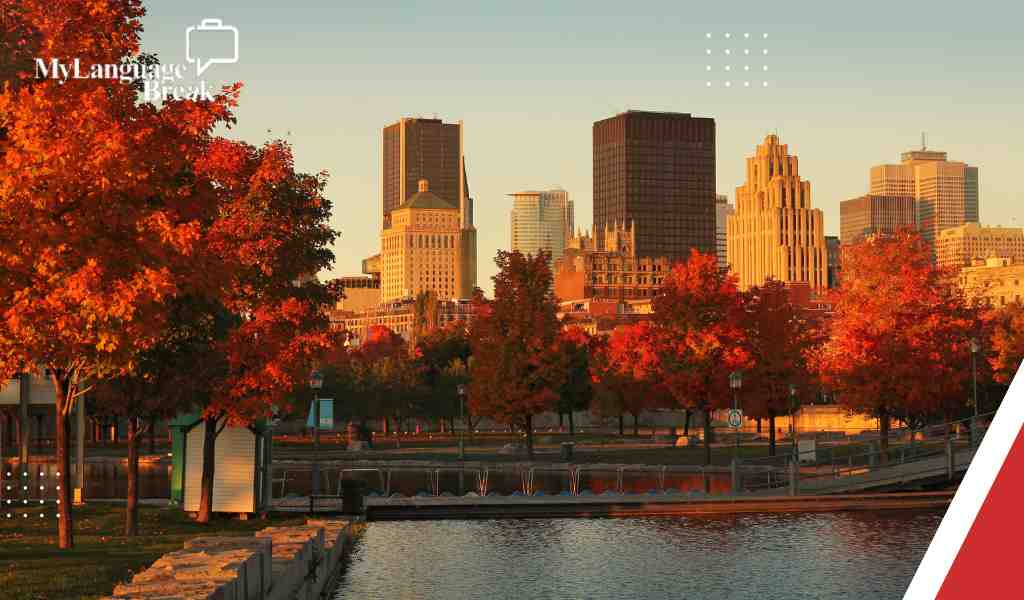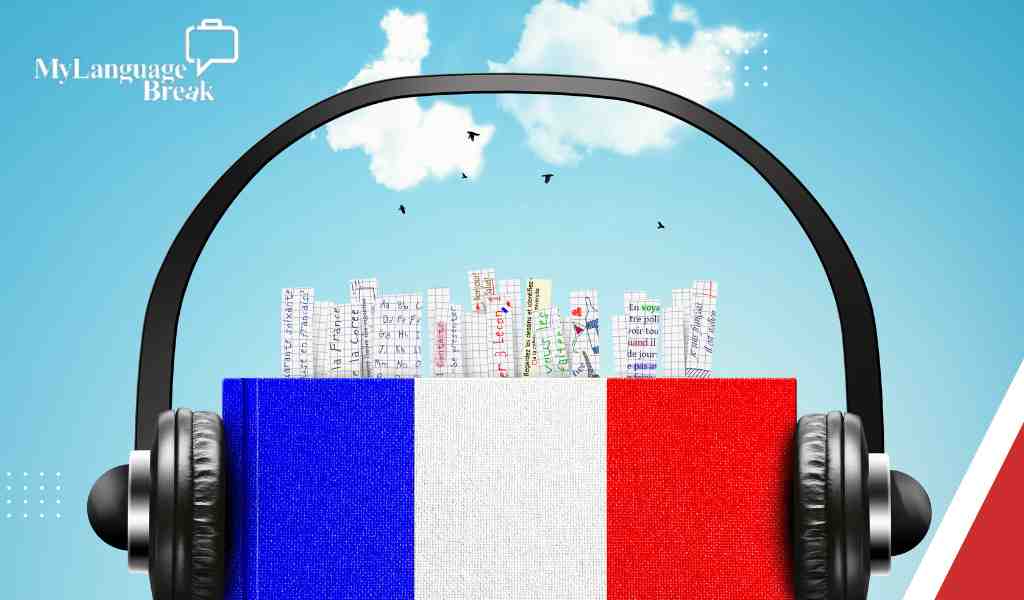The “city of festivities,” Montreal, is a never-ending celebration. Understanding French in this Canadian city is more enjoyable than ever before. In this post, we are going to explore precisely why Montreal is an outstanding place to learn French, vital information regarding how the language is spoken there, and, most significantly, where one can study French in this lively bilingual metropolis.

Why Learn French in Montreal?
Montreal is the perfect place to learn French. As the largest city in Quebec, it has a vibrant culture and is home to North America’s largest francophone population. Montreal offers an immersive environment where students can practice their language skills. With its wide variety of restaurants, cafes, and shops, it’s easy to find opportunities to engage with locals in French. In addition to being able to communicate with native speakers, learning French in Montreal also gives you access to various cultural experiences such as exhibitions, shows, and festivals that are exclusive to the city. Furthermore, studying in Montreal will give you the opportunity to make connections with people from all over the world. All these factors make Montreal a great place for anyone looking to learn or improve their French!
How does French in Montreal Differ from Metropolitan (France) French?
French in Montreal is different from Metropolitan French in several ways.
- Firstly, the accent of spoken French in Montreal is distinctively Canadian, with many local expressions and words that are not used elsewhere. In addition, the two varieties of French have developed differently over time and contain a variety of terms and expressions that are unique to one or another. This is due to the centuries-old history of French-speaking people in Canada and the influence they have had on both language varieties.
- Furthermore, Quebecois French is written using its own orthography, which differs from that used in France.
- Finally, there are also various grammatical differences between the two varieties; for example, some tenses are used more frequently in Montreal than they are in Metropolitan French. Despite these distinctions, both varieties still remain mutually intelligible for the most part.
Where to learn French in Montreal

Montreal is known as a hub of French-speaking culture, and there are many great places to learn the language. For those interested in immersion, there are several French language schools that offer courses for all levels, from beginner to advanced.
1. McGill University is a public research university located in Montreal, Canada. Founded in 1821, it is one of the oldest universities in the country and one of the most prestigious. It has two campuses: downtown Montreal and Macdonald Campus located on the outskirts of the city. McGill offers a wide range of programs, including Bachelor’s, Master’s, and Doctoral degrees as well as professional certificates. It also offers an extensive range of research opportunities and resources for its students. The university is renowned for its excellence in teaching, research, and community outreach activities. Notable alumni include five Canadian Prime Ministers, four Nobel Prize winners, and many other influential figures in politics, business, science, and culture. McGill is also home to some of Canada’s top-ranked schools, such as the Faculty of Medicine and the Desautels Faculty of Management. With its diverse student population from over 150 countries around the world, McGill provides a unique international learning experience that is unrivaled by any other institution.
2. Concordia University is a public university located in Montreal, Quebec, Canada. It was founded in 1974 following the merger of Loyola College and Sir George Williams University. Concordia provides undergraduate and graduate degrees in over 300 programs across its two campuses, Sir George Williams Campus and the Loyola Campus. The university also offers various exchange programs with universities across the world, allowing students to explore different cultures and experiences. The university has a strong focus on research and encourages students to be involved in various research activities throughout their studies. In addition, Concordia hosts numerous events throughout the year including music concerts, art exhibitions, lectures, and workshops. With its diverse student body and range of academic programs, Concordia is an excellent choice for those looking to further their education.
3. Université de Montréal is one of the leading universities in Canada and a major research institution. It is located in Montreal, Quebec, and is the largest university in the province. The university offers over 650 programs at both undergraduate and graduate levels in a wide range of disciplines, including medicine, engineering, law, architecture, business, science, and more. Its main campus covers more than 200 acres and features modern facilities for teaching, research, and student life. Université de Montréal also has several affiliated research centers that focus on areas such as health sciences, biotechnology, and innovation. It is consistently ranked among the top universities in Canada and around the world for its high-quality education and research achievements.
4. The Université du Québec à Montréal (UQAM) is one of the three universities that make up the Université du Québec network. Located in Montreal, Quebec, it is a public French-language institution of higher learning created in 1969. It has many faculties dedicated to different disciplines, including Arts and Sciences, Education, Fine Arts, Communications, and Political Science. UQAM offers over 300 programs at the undergraduate, graduate, and doctoral levels across its various faculties. The university also has several research centers dedicated to advancing knowledge in areas such as social sciences and humanities, health sciences, and engineering. UQAM is committed to providing high-quality educational opportunities for students from all backgrounds and strives to foster an environment of collaboration between faculty, staff, and students.

Non-university language schools and programs
5. The French School. This program provides a comprehensive French learning experience over the course of 20 sessions, with 60 hours of instruction. Suited to both novices and those brushing up on their language skills, it puts an emphasis on both written and oral lessons to enable you to use French in everyday situations.
6. YMCA International Language School. The YMCA of Montreal provides a wide selection of French (and other!) language classes that run either in the morning or night, depending on your preference. These courses are perfect for individuals of any age and knowledge level and go from topics like talking to business French or examination prep courses. In addition, they provide gap year programs, private lessons, and college readiness programs for those wanting to attend a French-language university in Quebec or Montreal.
7. Business French Summer School. This four-week, intensive summer course is designed for those striving to gain proficiency in French for business purposes. All participants must be at least 18 years old and will receive three language credits upon completion. Groups are kept small to promote learning through seminars and interactive oral communication exercises. Optional night activities with French guides are also available throughout the program.
8. Centre Saint-Louis. Aimed principally at Canadians by birth, Canadian citizens, permanent residents (e.g. university students), refugee claimants, refugees, and those with certain types of work permits, Centre Saint-Louis is an excellent choice for Montrealers wishing to enhance their French language skills. Students must be a minimum of 16 years old and present valid documents. The program fees are kept to a low level for eight different levels of courses, each lasting eight weeks.
9. CLC Montreal Language School provides a wide selection of French language courses to suit your needs. Choose from full-time, part-time, private, or Skype language programs, with a “Tea-Time” included in the curriculum. The Pre-immigration course prepares you for life in Montreal by teaching the French language and giving cultural insight. No matter your proficiency level, there is an appropriate course for you.
10. ALI Montreal, or the International Linguistic Academy, provides French language instruction to second language learners, as well as Youth Programs in French. FSL (French Second Language) instructional courses are suitable for all proficiency degrees and ages 17 and over; they can be taken on a full-time or part-time basis.
How much does it cost to live and study in Montreal?
Living and studying in Montreal can be quite affordable. The average cost of living for a student is estimated to be between $700 and $1000 a month, although this will vary depending on lifestyle preferences. This includes rent, utilities, food, transportation, entertainment, and other expenses. Tuition fees will also depend on the type of program chosen and whether you are an international or Canadian student. Generally speaking, studying in Montreal is relatively inexpensive compared to other major cities in Canada and around the world. Accommodation costs range from shared rooms in residences to private apartments; however, it is recommended that students stay in student residences as they offer more support services than private housing options. With its lively atmosphere, cultural diversity, and high-quality education institutions, Montreal is definitely worth considering as a study-abroad destination!
Conclusion
In conclusion, learning French in Montreal is a great way to immerse yourself in a diverse culture, explore the city and its culture, expand your knowledge of the French language, and build relationships with locals. Not only can you learn the basics of French, but you can also gain insight into the history, music, food, and art that make up this vibrant city. Learning French in Montreal is an exciting journey that has something for everyone. So why not give it a try?

Comments